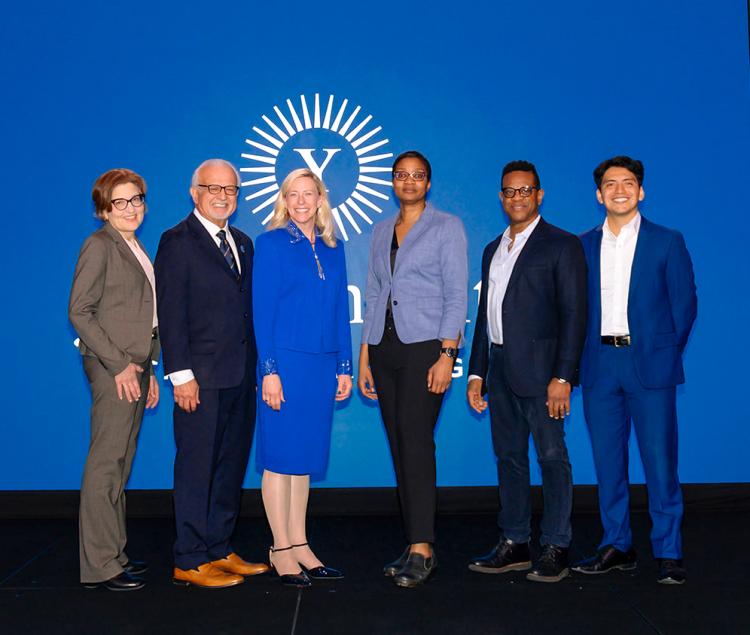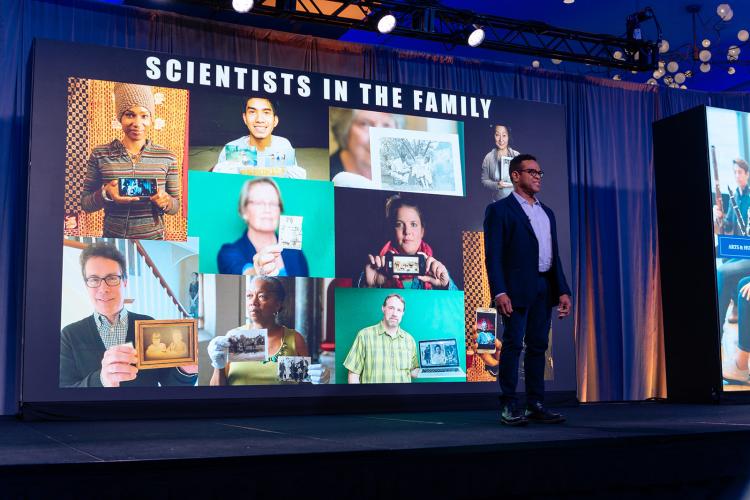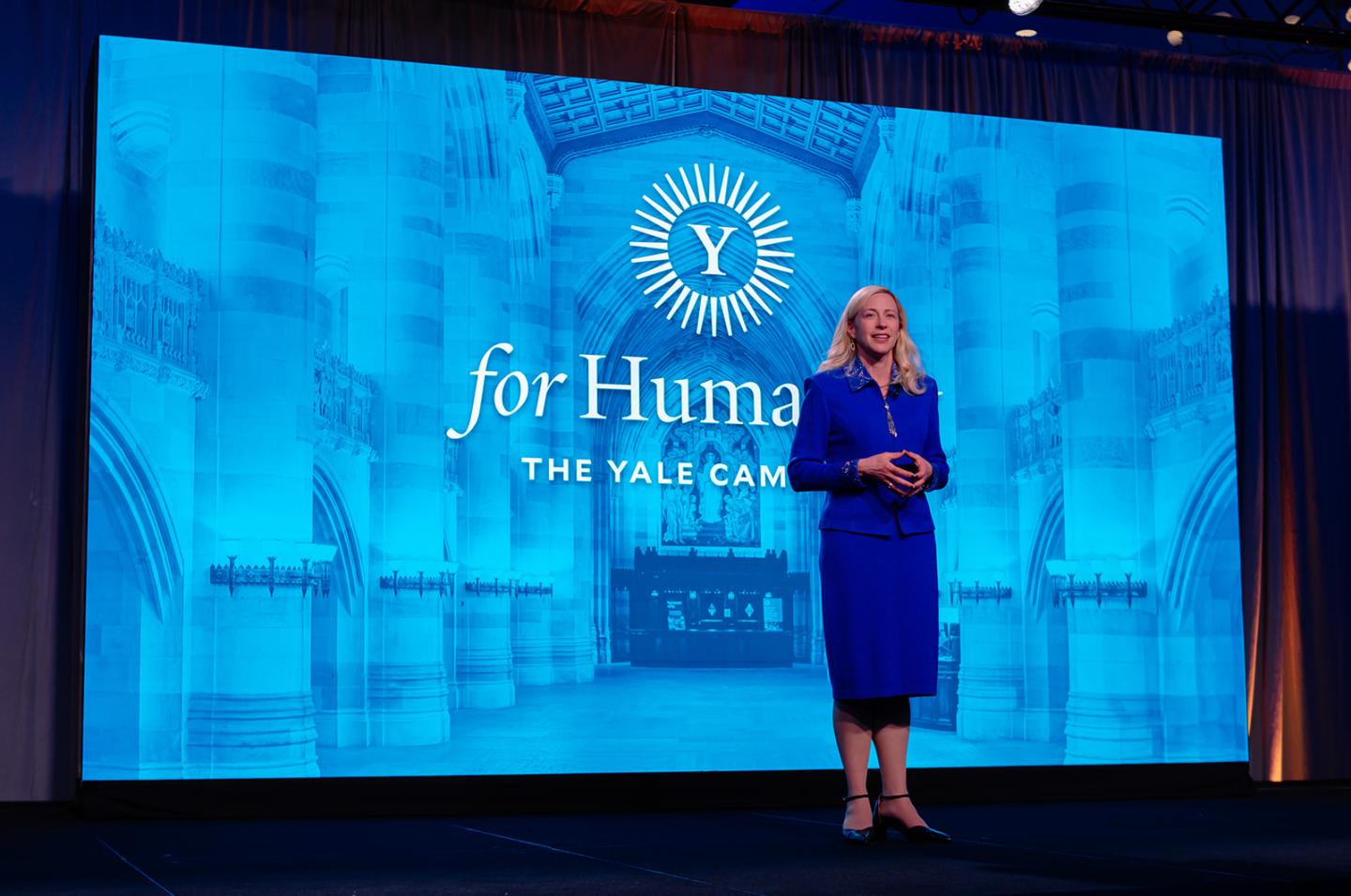On March 11th, more than 200 members of the Yale community gathered in Southern California at Anaheim’s Westin Resort for an evening of inspiration and connection and to hear from Yale’s president. Joining President Maurie McInnis ’96 PhD on stage were four distinguished speakers representing the impact areas of Yale’s ongoing For Humanity campaign: Arts & Humanities for Insight, Science for Breakthroughs, Collaborating for Impact, and Leaders for a Better World.
President McInnis began her opening remarks with an acknowledgment of the devastation and hardships caused by the recent LA wildfires.
“Characteristically, the local Yale community showed its strength,” she noted. “Many of you stepped up to coordinate volunteer initiatives, spearhead fundraising efforts, and connect those who can offer essentials with those who need them.”
McInnis pointed to a shared commitment and a belief in something larger than ourselves as two essential sources of community resilience when navigating challenging times.
“These are the very foundations upon which great universities are built—and on which we must rely as we are being tested in ways both familiar and new,” she said. “We are a great university because we are in perpetual motion—creating, building, and innovating for humanity.”

Thomas Allen Harris: For Fostering Collective Well-being through Storytelling
For thirty years, Harris, professor in the practice in African American studies and film and media studies, has been mining his family’s photo albums to explore how family stories impact our individual and collective identities.
This project culminated in a 2019 PBS series, Family Pictures USA, which brought together 100 different families who shared their photo albums to tell the story of American cities and places. The series revealed a deeply localized and nuanced portrayal of history—one that reflects the richness of diversity and complexity within our identities.
Harris spoke about the ways in which he brings this methodology of community storytelling to the courses he teaches at Yale. “My students learn to navigate issues around truth and power, using their family albums in ways that can tell stories about larger social and political movements.”
Although he has been sifting through his own family archive for decades, Harris only recently uncovered a photograph of his mother from her career as a chemistry professor for the first time.
“Why did it take me so long to find a photograph of my mom doing science? What produced such a gap in my own family archive?” he asked.
These questions inspired his latest film and national outreach project, Scientists in the Family, which uses the family photograph to uplift everyday stories of science, like his mother’s. “Using the archive and storytelling allows us to reflect on the past, and also to cultivate an inclusive and empathetic future—one that is truly for humanity.”

Vanessa Ezenwa: For One Health
As an ecologist, Ezenwa’s work focuses on understanding the drivers and consequences of infectious disease outbreaks in wild animals. “As we’ve seen with diseases like SARS-CoV-2 or more recently H5N1, many diseases that impact humans come from the wild. Therefore, to improve global health and pandemic preparedness, it’s imperative that we understand the complex interplay between the health of wild animals, domestic animals, and humans,” she said.
In her lab, Ezenwa, a professor of ecology and evolutionary biology, uses satellite imagery to study behavioral changes in African buffalo infected with bovine tuberculosis. “Sick animals move and interact differently from healthy ones,” she explained. After testing 500 African buffalo in the wild and gathering hundreds of high-resolution satellite images from areas where these animals congregate, results showed that buffalo stayed farther apart from each other in herds with more TB-infected individuals.
Ezenwa’s work is moving forward in exciting and interdisciplinary ways, as she and her colleagues integrate AI to develop a fast, efficient, and transferable wildlife disease detection method which could “revolutionize our understanding of—and response to—animal-borne disease outbreaks,” she said.
Judith Chevalier ’89: For Deploying Business and Economic Skills for Social Impact
Chevalier, the William S. Beinecke Professor of Finance and Economics, showcased some of the many ways students at the Yale School of Management (SOM) use skills they’ve learned in the classroom to address real problems faced by nonprofits and social enterprises in the local New Haven community.
As one example, a group of students in SOM’s Social Impact Consulting Club is working with New Haven Promise, a college scholarship and career development program, on a pro bono consulting project. They are analyzing hiring trends in the New Haven area and identifying gaps between skill sets in demand and New Haven Promise candidate profiles to develop a strategy to strengthen New Haven Promise candidate readiness.
As director of the Yale Program on Social Enterprise, Innovation, and Impact, Chevalier also oversees initiatives like the Golub Capital Nonprofit Board Fellows program, which creates opportunities for SOM students to serve as nonvoting members of nonprofit boards in and around New Haven and to undertake projects to assist the organization.
“Our goal is to be a place where purpose meets performance to provide the most rigorous and up-to-date business training, develop research that informs both policy and practice, and create an opportunity to put those learnings to good use for society,” she said.
Abnner Olivares ’24: For a World Where Opportunity is the Norm
Olivares, a Boyle Heights native and recent Yale College graduate, shared a stirring and powerful story about the larger meaning of the “Yale Dad” hat his father has been wearing since Olivares arrived at Yale as a first-year student.
Last month, in light of recent reports about planned large-scale immigration raids in major cities, Olivares asked his dad to be sure to wear the hat whenever he is out working his job as a street vendor in downtown LA.
“It wasn’t just about the raids,” said Olivares. “It was about what that hat now represented—what access to a place like Yale had not just given me but what it had given him. Not just a son with a college degree, but a different kind of recognition, of standing, of security, even if fragile.”
He went on to describe what he calls “the quieter, deeply personal, and often unseen transformations that happen when students—especially those from backgrounds historically excluded by race, wealth, or personal connections—are given access to these spaces.”
“These shifts don’t just affect the students themselves,” said Olivares. “They ripple outward—reshaping families and communities simply because they’ve been given proximity to opportunity.”
Olivares implored fellow alumni to reaffirm that opportunity is not a privilege for the few but a right for all. “Talent exists in every community, and it’s our responsibility to nurture it if we are truly to be leaders for a better world,” he said. “When we invest in people, we don’t just change one person’s life. We transform families, communities, and generations to come.”

Moving humanity forward
During her closing remarks, President McInnis observed that the four speakers demonstrated “how we have remained true to our perpetual search for light and truth at Yale.”
“As we have for over three centuries, we are continuously moving humanity forward, expanding the boundaries of knowledge, awakening minds, and helping our students reach ever higher for our country and our world,” she said.
“I hope you, like me, look forward to our future—clear-eyed, of course, about the challenges that lie ahead, but confident that Yale’s enduring mission will carry through.”
